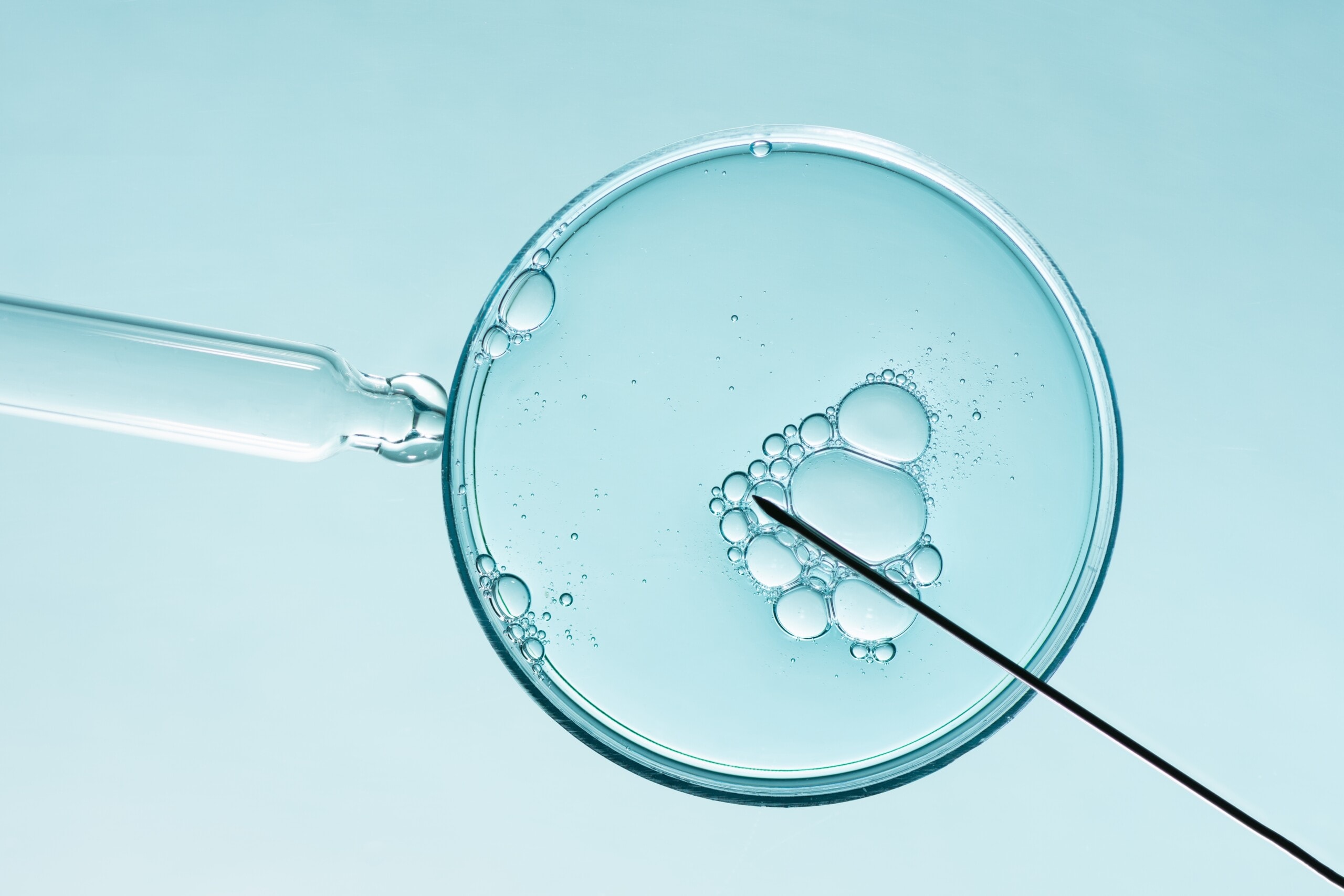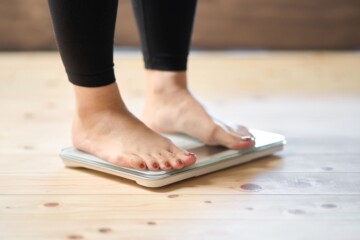Once you’ve decided to embark on your IVF journey, preparing your body becomes the foundation of your path to parenthood. This guide will help you explore how a balanced diet, healthy habits and looking after your mental wellbeing can contribute to a positive outcome. Learn more with our expert advice on how to prepare your body and mind for an IVF cycle.
Why is it important to prepare your body for IVF?
It’s important to prepare your body for IVF to improve your chances of gaining the most successful results. IVF can be an overwhelming experience, with many factors outside of your control, but physical and mental readiness are areas you can control, helping you to navigate the journey ahead.
Laying the groundwork for the best possible outcome from IVF can be achieved in several ways. Ultimately, it’s important to nurture your body by making enhancements to your daily habits to ready your body for treatment.
Optimal preparation and planning start with a vitamin-rich diet that can enhance egg and sperm quality and regular physical exercise not only supports your overall wellbeing but can improve the body’s response to IVF treatment.
How can you prepare your body for IVF?
Sleep, diet, exercise, as well as making other healthy lifestyle choices are all ways to prepare your body for IVF. Here, we discover the techniques to explore reproductive health in more detail and the science behind their benefits when it comes to fertility.
Maintain a healthy diet
Diet can have a major impact on fertility and IVF outcomes. In fact, maintaining a healthy and balanced diet is important to ensure that your body has all the micronutrients necessary for optimal metabolic processes.
Focusing on a Mediterranean diet (MeD) of nutrient-dense whole foods like fruits and vegetables rich in dietary fibre, omega-3 fatty acids, plant-based proteins, vitamins and minerals is ideal. The MeD has also been associated with positive changes in insulin resistance, metabolic disturbances, and lowering the risk of obesity. Studies show that a healthy diet can increase the chances of a live birth for women using assisted reproductive technology like IVF.
When it comes to preparing for IVF, you should avoid processed foods such as ready meals, high GI carbohydrates such as white bread, refined sugar and trans fats found in baked goods, as data has shown that these can negatively affect fertility. Check out our fertility diet plan for a full breakdown of the best foods to integrate into your meal plan and more information about foods that are high in essential nutrients and vitamins and why they are often recommended to women trying to conceive.
Avoid alcohol where possible
Heavy or regular consumption of alcohol can be disruptive to reproductive health, impacting embryo development and lowering the chances of a live birth. Scientific evidence suggests that drinking alcohol has a significant impact on fertility and conception.
One study revealed that female alcohol intake was associated with 2-3 times the adjusted risk of spontaneous abortion compared with no intake. Further research found that consumption of as few as four alcoholic drinks per week is associated with a decrease in IVF live birth rates.
When preparing your body before and during IVF treatment cycles, it’s best to avoid drinking alcohol. Get more details on drinking when trying to conceive in our blog.
Reduce caffeine intake
While research is mixed, some studies suggest high caffeine consumption may reduce fertility and IVF success rates. It’s wise to limit coffee, tea and caffeinated drink intake before and during your IVF. The NHS recommended amount of caffeine is 200mg per day, which is roughly two cups of coffee per day.
An analysis of observational studies has found that women who are trying to conceive should be advised to avoid caffeine because the evidence suggests maternal caffeine consumption is associated with negative pregnancy outcomes.
There is also research indicating increasing the dose of caffeine during pregnancy was associated with miscarriage risks, compared with no caffeine intake. Getting into the habit of reducing your caffeine intake as you prepare your body for IVF will, therefore, limit any of those associated risks.
Try fertility supplements
A good quality egg can take 3 to 4 months to fully mature to the stage of ovulation, so it’s important to take the right nutrients to support this development process.
Egg quality is critical to the IVF cycle and can impact the success of the treatment. There are many supplements on the market, so understanding the research is crucial to make an informed choice.
As a minimum, folic acid should be taken in preparation for IVF and up to 12 weeks into the pregnancy. IVF supplements such as Impryl can help to improve egg and sperm quality, ovulation and response to fertility medications.
Impryl contains therapeutic doses of key research-backed ingredients to bolster natural antioxidant defences and deliver balanced support to your metabolism to ensure its optimal for fertility and the growth of your baby. The micronutrients within Impryl help to prevent both DNA fragmentation and DNA decondensation.
Dr Gill Lockwood, Medical Director and Fertility Specialist. says “Impryl’s micronutrients have been proven to help infertile women get a better chance of having a healthy baby, and no other supplements on the market have this strong clinical evidence.”
Improve your chances of successful IVF today
The fertility supplement for both men and women.
Exercise regularly
Moderate exercise like walking, yoga, swimming and low-impact training can boost fertility by managing weight, reducing stress, and enhancing insulin sensitivity.
Studies show regular exercise throughout treatment is recommended, and it isn’t just about physical health but creating an optimal environment for successful IVF treatment, increasing blood flow and balancing hormones.
Always tailor exercise to your body’s needs and capabilities – intense overexercising should be avoided and can have the opposite effect. Integrate regular exercise into your routine to encourage a sense of wellbeing and readiness emotionally as well as physically. Studies have also found a significantly lower rate of gestational diabetes and preeclampsia in women who maintained an active lifestyle during their IVF pregnancy.
Improve your sleep quality
Low sleep quality is common in women scheduled for IVF and could influence the success of the procedure. Improving your sleep quality is critical when preparing for IVF, as inadequate sleep can be detrimental to your health and wellbeing, with the potential to impact reproductive health. Sleep deprivation has been linked to hormonal imbalances, reduced fertility, and decreased chances of successful embryo implantation and pregnancy.
A study found that women with poor sleep quality had significantly lower levels of the fertility hormones LH and FSH, as well as higher levels of the stress hormone cortisol, compared to those with good sleep quality. Good sleep quality has been positively associated with IVF outcomes, particularly with clinical pregnancy and live birth.
Try to find a way to wind down to bedtime so you can prepare yourself for sleep. Things like reading, yoga and meditation are all techniques that can help. Keep lights dim and reduce artificial light in the evening to increase melatonin, the hormone for sleep and egg quality.
Avoid smoking and harmful chemicals
When trying to conceive, and especially when about to undergo IVF treatment, the spotlight on lifestyle choices, such as smoking, stands paramount. Research shows that smoking can reduce fertility rates significantly, affecting egg and sperm quality and impacting whether IVF procedures are successful.” Smoking and exposure to an environmental toxin can create a hostile environment for conception, echoing through every stage of IVF,” says a pivotal study from the American Society for Reproductive Medicine.
Further research also showed that the risk of infertility increased by over 41% among current smokers compared to those who had never smoked. There are resources available from the NHS to help you take the steps needed to quit smoking.
Alongside this, we should consider the chemicals found in everyday life, from pesticides to certain plastics. These can disrupt hormonal balance and complicate the fertility journey. Embracing a lifestyle that is free of harmful chemicals and creating a nurturing environment for conception means stepping away from smoking to set healthy habits for pregnancy and beyond. Read more about the links between smoking and fertility in our blog.
Look after your mental health
The emotional impact of fertility concerns can take its toll on your mental health. From stress to depression and anxiety, it’s more common than you think to suffer mentally as well as physically with your fertility issues. Fertility Network UK found that 90% of women and men struggling with fertility problems reported feeling depressed. 50% said that they felt out of control and frustrated, helpless, worried and fearful, and 42% had suicidal thoughts. It is important to be open about how you are feeling and seek support and professional counselling if you need to.
Preparing for IVF can be daunting, and it’s important to protect your wellbeing as there is a close relationship between struggles to conceive and mental health disorders. Studies show that preconception stress increases the risk of infertility. Find out more about the link between infertility and mental health in our blog, along with tips for looking after your mental health through fertility struggles.
In conclusion, preparing your body and mind for IVF is a holistic process that encompasses a balanced diet, correct supplementation, regular exercise, mental health care, and the avoidance of harmful substances. Making these informed lifestyle choices will support you through the IVF process and towards the goal of parenthood.
References:
Skoracka K, Ratajczak AE, Rychter AM, Dobrowolska A, Krela-Kaźmierczak I. Female Fertility and the Nutritional Approach: The Most Essential Aspects. Adv Nutr. 2021 Dec 1;12(6):2372-2386. doi: 10.1093/advances/nmab068. PMID: 34139003; PMCID: PMC8634384.
Van Heertum K, Rossi B. Alcohol and fertility: how much is too much? Fertil Res Pract. 2017 Jul 10;3:10. doi: 10.1186/s40738-017-0037-x. PMID: 28702207; PMCID: PMC5504800.
Tine Brink Henriksen, Niels Henrik Hjollund, Tina Kold Jensen, Jens Peter Bonde, Anna-Maria Andersson, Henrik Kolstad, Erik Ernst, Aleksander Giwercman, Niels Erik Skakkebæk, Jørn Olsen, Alcohol Consumption at the Time of Conception and Spontaneous Abortion, American Journal of Epidemiology, Volume 160, Issue 7, 1 October 2004, Pages 661–667, https://doi.org/10.1093/aje/kwh259
Rossi BV, Berry KF, Hornstein MD, Cramer DW, Ehrlich S, Missmer SA. Effect of alcohol consumption on in vitro fertilization. Obstet Gynecol. 2011 Jan;117(1):136-142. doi: 10.1097/AOG.0b013e31820090e1. PMID: 21173655; PMCID: PMC4487775.
James JEMaternal caffeine consumption and pregnancy outcomes: a narrative review with implications for advice to mothers and mothers-to-beBMJ Evidence-Based Medicine 2021;26:114-115.
Weng X, Odouli R, and Li D-K. Maternal caffeine consumption during pregnancy and the risk of miscarriage: a prospective cohort study.
Am J Obstet Gynecol 2008;198:279.e1-279.e8
Mussawar M, Balsom AA, Totosy de Zepetnek JO, Gordon JL. The effect of physical activity on fertility: a mini-review. F S Rep. 2023 Apr 14;4(2):150-158. doi: 10.1016/j.xfre.2023.04.005. PMID: 37398617; PMCID: PMC10310950.
Forouzan Charkamyani, Azadeh Hosseinkhani, Leila Neisani Samani & Leila Khedmat (2019) Reducing the Adverse Maternal and Fetal Outcomes in IVF Women by Exercise Interventions During Pregnancy, Research Quarterly for Exercise and Sport, 90:4, 589-599, DOI: 10.1080/02701367.2019.1639601
Reschini, M., Buoli, M., Facchin, F. et al. Women’s quality of sleep and in vitro fertilization success. Sci Rep 12, 17477 (2022). https://doi.org/10.1038/s41598-022-22534-0
ZhengLiu,Ph.D, YukunZheng,M.S, BingyuWang,M.S, JialinLi,M.S, angQin,Ph.D., XiaoLi,Ph.D., XinLiu,M.S., YuehongBian,Ph.D., ZijiangChen,Ph.D., HanZhao,Ph.D. and ShigangZhao,Ph.D.: The impact of sleep on in vitro fertilization embryo transfer outcomes: a prospective study, November 23, 2022DOI:https://doi.org/10.1016/j.fertnstert.2022.10.015
He S, Wan L. Associations between smoking status and infertility: a cross-sectional analysis among USA women aged 18-45 years. Front Endocrinol (Lausanne). 2023 Apr 19;14:1140739. doi: 10.3389/fendo.2023.1140739. PMID: 37181041; PMCID: PMC10168125.
Lynch CD, Sundaram R, Maisog JM, Sweeney AM, Buck Louis GM. Preconception stress increases the risk of infertility: results from a couple-based prospective cohort study–the LIFE study. Hum Reprod. 2014 May;29(5):1067-75. doi: 10.1093/humrep/deu032. Epub 2014 Mar 23. PMID: 24664130; PMCID: PMC3984126.








